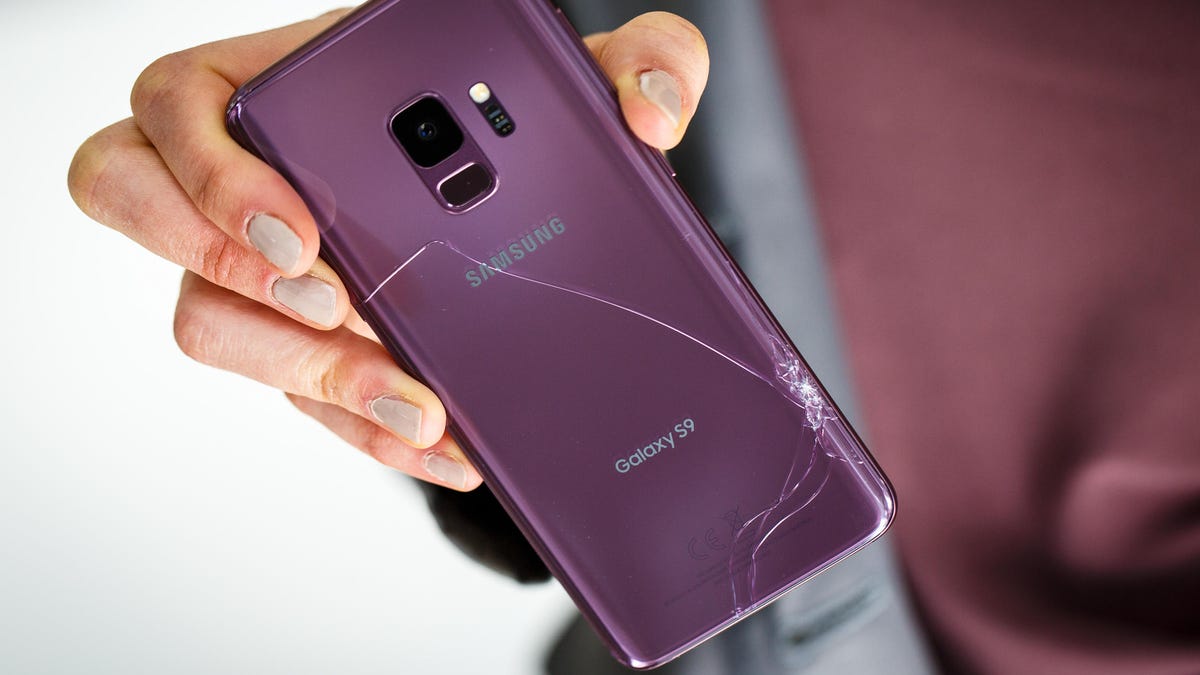Galaxy S9 drop test: The back cracked, but the screen held up
We dropped a brand-new Samsung Galaxy S9 onto the sidewalk to see how much it can handle.

If there's one thing our drop tests have taught us it's that phones with glass backs do not hold up well when dropped on concrete sidewalks. We didn't expect that to change with Samsung's new Galaxy S9. It uses the same Gorilla Glass 5 material as the previous Galaxy S8 , and the Galaxy Note 8 both on the front and back of the phone, and it has the same curved edges on either side.
The back of the Galaxy S8 broke on the first fall from hip height in our previous drop test, but the screen remained intact despite dropping it from 5 feet onto a gravel road. Going into our test, I didn't expect the Samsung Galaxy S9 to have the same good fortune as its predecessor considering it's about 8 grams heavier and 0.5 mm thicker. Plus there's no way that curved screen could come out unscathed from another round of drops. Right?!
Drop test 1
We took our brand-new lilac purple Galaxy S9 to the sidewalk near CNET's San Francisco office, the same sidewalk where the iPhone X had cracked on its first drop in our test just a few months before. As in previous tests, the drop height for our first round was 3 feet (0.9 meters), simulating what would happen if it fell from your pocket.
This test only approximates a real-world scenario, with no way to have full control of how the Galaxy S9 is going to land. I dropped it screen side up first to evaluate the toughness of the backside. The back did in fact hit first, but it wasn't completely flat upon impact. The right side hit the ground initially, and then the phone pivoted off the corners until it settled on the floor.
The phone had significant damage on the point of impact, right on the curve of the glass.
The screen, as expected, survived without a scratch, but the back was badly broken. The left side had shattered right on the point where the glass curves. There were tiny shards of glass coming off the phone as I ran my finger over it. There was also a large fracture that went from the damaged edge to the bottom of the phone, with small dents on the metal frame and no damage to the rear-facing camera. The phone survived, but it was definitely busted to the point that it would require a case to continue using.
Drop test 2
We set our next test at the same 3-foot height, but this time I wanted to see if I could actually break the screen. So I dropped it face down onto the cement sidewalk.
It landed flat on its face with nearly no bounce and a loud thump that sent chills down my spine. Before even turning it over, I could tell that the damage on the back had gotten worse. Upon closer examination I noticed the fractures extended outward from the initial point of impact. It now had a large fracture running through the middle of the phone, the Samsung logo and out the power button. It had also lost a few more shards of glass that had been loose on the side.
The fractures on the back grew and made their way to the other side of the phone cutting through the logo. But the screen survived!
But to my surprise, that super AMOLED screen still looked pristine. Were it not for the video footage and a minuscule scuff to the right of the front-facing camera, I wouldn't have believed this was the side it had landed on. This was the same fall that broke the screen of our iPhone X in our previous test.
You really have to squint to notice the one tiny scuff on the screen after the phone landed face down on the sidewalk.
The breakdown
The Galaxy S9 may have cracked on the first drop, but it holds up where it counts. The screen weathered the harsh sidewalk surface where many phones have failed. I'm starting to think it's no fluke, though it's still a mystery as to why it's happening.
Upon examining the damage on the Galaxy S8 we dropped last year, I noticed some similarities with the S9 in the type of fractures it sustained on the back and the lack of damage on the front. This should come as no surprise, since they're made from the same glass and the design is almost identical. This is the second time the screen on a Galaxy has survived our drop tests.
We reached out to Samsung to find out why the glass on its screens seems to be better at withstanding falls, and while they did not offer an explanation, they did mention that the S9's frame has been upgraded to 7000-series aluminum.
But because our tests are not scientific, this could also be just another coincidence. Either way, you should definitely protect your brand-new Galaxy S9 with some type of case or insurance plan. Don't expect your screen to survive the same kinds of falls.

